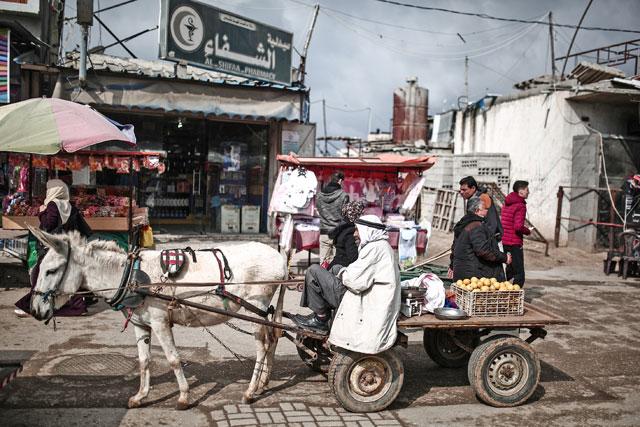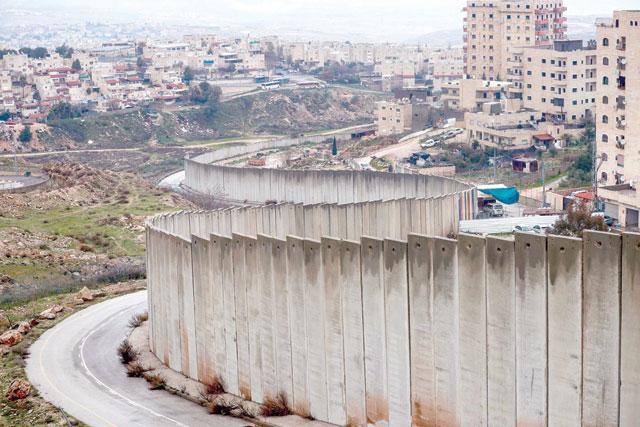You are here
Israel rejects UN report on companies linked to settlements
By Reuters - Feb 01,2018 - Last updated at Feb 01,2018

A bulldozer of Israeli army demolishes a house under construction belonging to Palestinian Ziyab Racih, with claim of being under Israeli controlled area in Decen village of Nablus, West Bank, on Thursday (Anadolu Agency photo)
GENEVA — The United Nations human rights office said on Wednesday it had identified 206 companies doing business linked to unlawful Israeli settlements in the West Bank and it urged them to avoid any complicity in "pervasive" violations against Palestinians.
Israel fears that companies listed on any UN "blacklist" could be targeted for boycotts or divestment aimed at stepping up pressure over its settlements, which most countries and the world body view as illegal.
"Businesses play a central role in furthering the establishment, maintenance and expansion of Israeli settlements," the UN report said.
"In doing so, they are contributing to Israel's confiscation of land, facilitate the transfer of its population into the Occupied Palestinian Territory and are involved in the exploitation of Palestine's natural resources," it said.
The majority of the companies, or 143, are domiciled in Israel or the settlements, followed by 22 in the United States, it said. The remainder are based in 19 other countries, including Germany, the Netherlands, France and Britain.
The UN report did not name the companies and said that its database was not yet complete.
Israel's ambassador, Aviva Raz Shechter, said her government was still studying the report, launched by a resolution of the UN Human Rights Council in March 2016, but rejected the concept as "fundamentally illegitimate".
"It is outside the competence and the authority of the Human Rights Council to deal with blacklisting. ... This is part of the bias to try to delegitimise Israel," Raz Shechter told Reuters.
Israel did not want to see the UN human rights office at the “forefront of a BDS [Boycott, Divestment, Sanction]” movement, she said.
Raz Shechter declined to discuss any of the Israeli companies or say whether some were state-owned, adding: “Companies are not engaged in any unlawful activities.”
Israel’s main ally, the United States, says the 47-member Human Rights Council is stacked with opponents of Israel. US Ambassador Nikki Haley told the Council last June that it was reviewing its participation given the forum’s “chronic anti-Israel bias”.
Haley said in a statement on Wednesday that while the report “wisely refrained from listing individual companies, the fact that the report was issued at all is yet another reminder of the council’s anti-Israel obsession”.
‘Corporate responsibility’
The report said that the work in producing the UN database “does not purport to constitute a judicial process of any kind”.
But businesses operating in the occupied territories have a corporate responsibility to carry out due diligence and consider “whether it is possible to engage in such an environment in a manner that respects human rights”, it said.
The office’s mandate was to identify businesses involved in the construction of settlements, surveillance, services including transport, and banking and financial operations such as loans for housing.
Violations associated with the settlements are “pervasive and devastating, reaching every facet of Palestinian life,” the report said. It cited restrictions on freedom of religion, movement and education and lack of access to land, water and jobs.
The report is to be debated at the UN Human Rights Council session of February 26 to March 23.
Related Articles
GENEVA — Israel accused the United Nations on Tuesday of continuous discrimination against it over its treatment of Palestinians and called
WASHINGTON — US Secretary of State Mike Pompeo on Thursday denounced the UN release of a list of companies involved with Israeli settlements
WASHINGTON — The United States said on Friday it was pressing the United Nations not to update a blacklist of companies doing business in Is
















